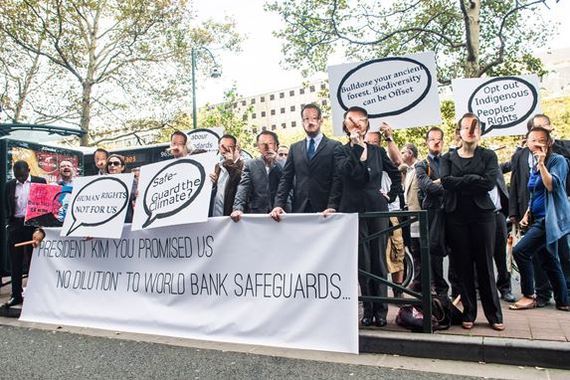Co-authored by Julia Radomski, Information Services Coordinator at Bank Information Center
The World Bank has been reviewing its environmental and safeguard protection policies for the past four years. Nearing the end of the process, the political battle over these policies is far from resolved. Last week four U.S. Senators directly entered the fray. Members of U.S. Senate Foreign Relations Committee are asking the U.S. Treasury to take a strong stance on the World Bank's environmental and social safeguard policies, pointing to significant flaws in the proposed draft. Their opposition may even affect the monetary contributions of the U.S. government to the World Bank's fund for the poorest countries.
The policies in question are the primary path through which the World Bank identifies and minimizes harm to people and the environment resulting from the projects that they fund. U.S. Senators Barbara Boxer, Benjamin L. Cardin, Robert Menendez, and Edward J. Markey released a letter they sent to U.S. Treasury Secretary Jacob Lew calling on the Treasury to prevent the impending dilutions to these environmental and social safeguard policies.
Video caption: World Bank Safeguards Explained (Video credits: Bank Information Center)
The World Bank's safeguards review will change the ways international institutions are held accountable for the problems caused by development projects, including resettlement, labor issues, environmental degradation, and harm to vulnerable groups like children and persons with disabilities. Aside from the inherent value of protecting communities and ecosystems, the Senators pointed to legal requirements mandated by the U.S. Appropriations Acts of 2014 and 2015. These requirements state that the U.S. Treasury must vote against any weakening of World Bank environmental and social protections, and must vote against all projects proposed under weakened safeguards.
The letter points to controversial problem areas in the most recent draft of the safeguard policies, including transparency, accountability, and protections for human rights. For instance, the policies should require transparency on key project documents, allowing communities to voice their concerns before projects are approved. The Senators also believe that the World Bank's accountability mechanism will be weakened under the proposed safeguards policies, because of muddled language on the responsibilities required of the World Bank and of borrower countries. Because of the weaknesses in the proposed safeguards policy, the Senators' argue that the U.S. Treasury is obligated by law to oppose the draft.
Photo caption: Protesters in front of the World Bank office in Brussels (Belgium), September 2014. Civil society groups have been protesting the proposed policy dilutions in many countries around the world. (Photo credits: Arnaud Ghys)
The fact that the eighteenth replenishment of the International Development Association (IDA), the World Bank's fund for the poorest countries, is currently underway is a connection that should not be ignored. Donor governments are currently considering the public monies they will contribute to IDA, and what development issues they want to be prioritized in return. If the U.S. insists on the importance of human and environmental protections, the hint of losing contributions may catch the attention of the World Bank in ways that civil society voices have not. By hitting the Bank where it hurts (the pockets) the U.S. contribution to IDA has the potential to strengthen the safeguards - if the U.S. government will take a stand.
Senators Boxer, Cardin, Menendez, and Markey urge Treasury Secretary Lew to "maintain U.S. leadership at the World Bank to prevent the dilution of existing protections." By doing so, the Treasury will be "protecting our investments as well as social and environmental interests."
The U.S. Treasury should heed the arguments of the Senate Foreign Relations Committee, and do all they can to demand protections for people and the planet. Without strong safeguard policies, there is no assurance that U.S. public funds are being put to use for their intended purpose of fostering shared prosperity and poverty alleviation. Simply put, the U.S. should not give the World Bank a blank check.

